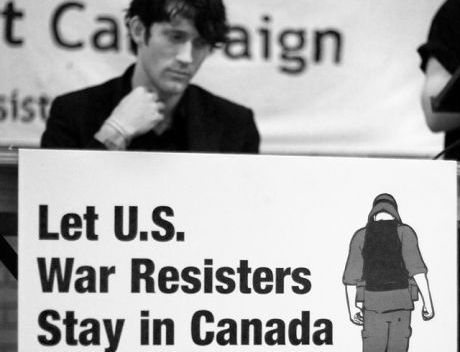Features
You are here
A decade into the Iraq War, campaign for war resisters continues

March 25, 2013
Ten years ago, the United States redoubled it’s efforts in the destruction and occupation of Iraq, moving from sanctions back to bombing and killing. Nine years ago, the people across Canada started welcoming a new generation of US soldiers of conscience from another illegal and immoral US war.
The War Resisters Support Campaign (WRSC) is an intergenerational mix of Americans who emigrated during the US war on Vietnam, the Canadians who helped them, and those who have grown up being proud of that legacy. Together the campaign has made every effort to uphold the rights of US war resisters to refuse service to a military (and a country) which will not honour international law and a soldier’s obligation to refuse to commit war crimes and participate in an illegal war.
The struggle to allow US war resisters from Iraq and Afghanistan to settle in Canada has not been easy and is not over. The campaign has successfully engaged this issue in three ways: providing the means for war resisters and their families to economically and socially integrate in their new communities, connecting them with legal council to navigate the Immigration and Refugee system as political refugees, and become involved in the national political system in order to have the federal government create a provision for immigration for war resisters.
The WRSC has been able to identify and promote broad support for war resisters, quantified in a 2008 poll that said two thirds of Canadians think the war resisters should become permanent residents. Parliament has twice voted to stop the deporation of war resisters and to let them stay. There has also been internatioanal support for war resisters, from Vietnam resister Ron Kovic to Archbishoip Desmund Tutu. But under the Conservative government of Stephen Harper, with Jason Kenney as Minister of Citizenship and Immigration, this democratic will has been thwarted multiple times through ignoring Parliament and unethical interference in the refugee system.
Jason Kenney labelled war resisters as "bogus refugee claimants," an allegation opposed by the Canadian Council for Refugees as giving "the strong appearance of political interference." Kenney then institutionalized this prejujudice with Operational Bulletin 202, which labels war resisters "criminally inadmissible." According to Amnesty International, it is "a violation of international refugee law to suggest that deserters are automatically inadmissible to Canada...Amnesty International believes that Operational Bulletin 202 misstates the law and seeks to intrude on the independence of both IRB members and Immigration Officers."
The struggle continues through the determination of war resisters, the diligent work of their lawyers, and the ongoing campaign of their supporters. Federal courts have ruled 11 times since 2008 that the IRB have made errors in the cases of war resisters. Most recently, the federal court found that the US court-martial system “fails to comply with basic fairness requirements found in Canadian and International Law.”
At any point, the Minister of Citizenship and Immigration can create a provision for a group of people to be provisionally admitted to Canada with permanent resident status. It’s been proven that the US military court-martial system is unfair and that war resisters who’ve been to Canada have been punished more harshly. Join the campaign in defending our collective right to peace and freedom and providing a sanctuary for war resisters in Canada once and for all.
Section:










